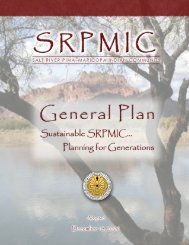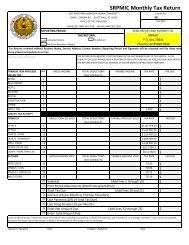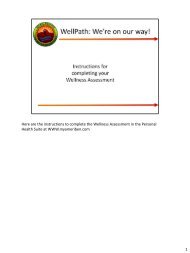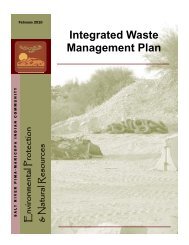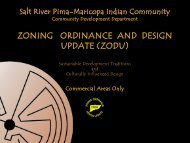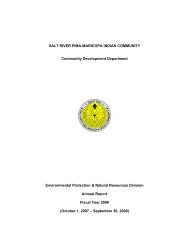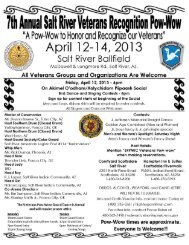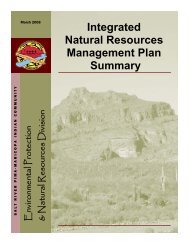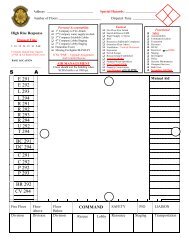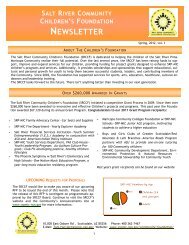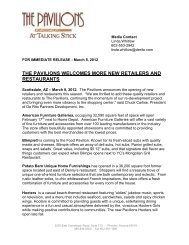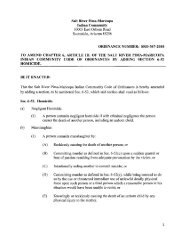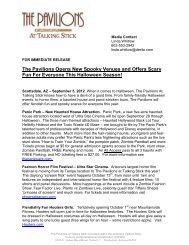2009 - Salt River Pima-Maricopa Indian Community
2009 - Salt River Pima-Maricopa Indian Community
2009 - Salt River Pima-Maricopa Indian Community
You also want an ePaper? Increase the reach of your titles
YUMPU automatically turns print PDFs into web optimized ePapers that Google loves.
Environmental Programs &<br />
Policy Development<br />
Summary<br />
The Environmental Programs and Policy Development (EPPD) Program’s main goal is to prevent<br />
pollution within the <strong>Community</strong>. Activities carried out by this program are supported by the<br />
development of policies and ordinances designed to reduce the risks of exposure to<br />
contaminants and to safeguard human health and the environment. EPPD is comprised of the<br />
Solid Waste, Pesticide, Hazardous Substances, Recycling, and Environmental Policy Programs.<br />
Solid Waste<br />
The Solid Waste Program works toward reducing waste and pollution by responding to illegal<br />
dump sites in the <strong>Community</strong> and developing site cleanup plans. The Solid Waste Program often<br />
collaborates with Range Management and Engineering and Construction Services to address<br />
illegal dumpsites in the open range areas within the <strong>Community</strong> and facilitates enforcement<br />
actions against illegal dumpers with the <strong>Salt</strong> <strong>River</strong> Police Department.<br />
In FY<strong>2009</strong>, EPNR enhanced the Inoperable Vehicle Removal Program by teaming with Pavilions<br />
Auto Care to provide <strong>Community</strong> residents incentives for removing inoperable vehicles.<br />
The Solid Waste Program addresses illegal dump sites such as these abandoned tires (left) and<br />
abandoned vehicles (right), waste tire and inoperable vehicle removal are 2 services SRPMIC<br />
provides to the <strong>Community</strong> free of charge.<br />
2,621 waste tires and 6 inoperable vehicles<br />
were removed from the <strong>Community</strong> in FY<strong>2009</strong>.<br />
Pesticide Program<br />
The Pesticide Program oversees the safe use, transport, and storage of pesticides within the<br />
SRPMIC, both on agricultural lands and structural applications, to ensure compliance with federal<br />
and <strong>Community</strong> laws in order to protect agricultural worker safety, <strong>Community</strong> Members and<br />
residents, and the quality of the land, air, and water.<br />
Biennial pesticide safety training classes were hosted for employees of the leased farms<br />
operating within the <strong>Community</strong>, and for employees of Public Works and Water Resources. All<br />
attendees earned Pesticide Handler certifications valid for three years. EPNR coordinated with<br />
the Arizona Department of Agriculture and the Arizona Office of Pest Management to facilitate<br />
training and sampling activities with their staffs, and the review of licensing registrations and<br />
compliance documentation. EPNR created a notification form and a requisite database allowing<br />
for e-mail pre-notification of all pesticide applications within the <strong>Community</strong>.<br />
In FY<strong>2009</strong>, EPNR coordinated Worker Protection<br />
Standard inspection training activities with the Navajo<br />
Nation and the Colorado <strong>River</strong> <strong>Indian</strong> Tribes.<br />
12



